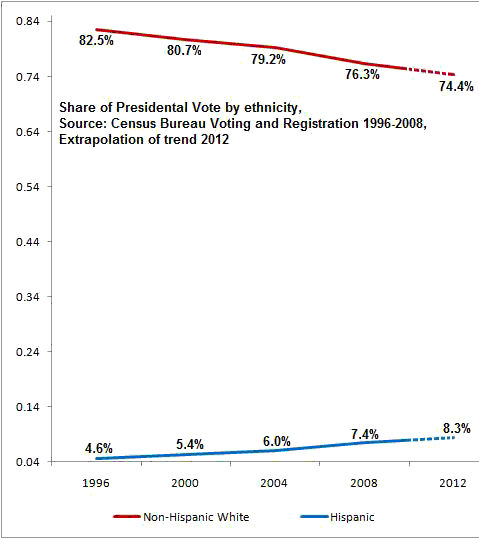Democrats are right when they say that demographic change will eventually make it impossible for a conservative Republican to be elected president.
Following the 1965 immigration reform, the population share of Hispanics is projected to grow from about 4 percent in 1960 to 30 percent in 2050. Hispanics unmistakeably lean Democrat, in part because of low average income and support for redistribution. They and other Democrat-leaning minorities which are growing their population share will sooner or later make conservative Republicans nationally unelectable.
However, the left appears to be overestimating the speed of demographic transformation. In many articles about the 2012 election, they argues that rise in the Hispanic population share is the key to President Obama’s re-election. This in unlikely to be the case.
Sure, the Hispanic, Asian and African American vote share is rising, but only very gradually. The Hispanic vote is still surprisingly small. In 2008, according to the Census Bureau – which is more comprehensive than exit poll – estimated that non-Hispanic whites were 76.3% of voters, whereas Hispanics were 7.4%.
The reason for the surprisingly low number is that Hispanics are more likely to be below voting age, more likely not to be citizen or (or even legal resident), and less likely to vote. Thus in 2008 Hispanics were 15.4% of the population, 13.6% of the voting age population, 9.5% of citizens and 7.4% of voters.
Demographic change between 2008 and 2012 is going to be small. The Hispanic population share (and that of other groups) has been growing at a steady rate, a rate not projected to change by Census Bureau. So I just extrapolate the increase in the share of voters four years into the future, using the growth rate between 1996-2008. Using this simple method the Hispanic voting share is expected to be around 8.3% in 2012.
Combining the projected 2012 population share with recent voting patterns, the Democrats are expected to gain about 0.4-0.5% because of demographic change. This advantage will add up over time, but is not fast enough to determine the 2012 election , unless the election is extremely close.

You sometimes read that the Hispanic vote is concentrated in battleground states. While this is true for four battleground states (certainly not to be ignored), it is not true overall.
Take a traditional set of 18 battleground states, namely Ohio, Florida, Pennsylvania, Michigan, Colorado, New Hampshire, Virginia, Iowa, Missouri, Georgia, Indiana, Minnesota, Wisconsin, Montana, Oregon, Nevada, New Mexico and North Carolina.
Out of these 18, only four – Florida, Colorado, Nevada and New Mexico – have a Hispanic vote above the national average. The rest were below the national average. This is not strange once you take into account the fact that half of all Hispanics live in California, Texas and New York, three non-contested states.
In 2008, while Hispanics were 7.4% of the national vote, they were only 4.7% of the vote in the battleground states.
The gains Obama is expected to make on the back of demographic transformation in 2012 roughly cancels out the disadvantage from losing electoral votes following reapportionment. Demographic transformation is a real force, but The President and his supporters must be more patient for the shifting demography to start winning them elections.
Disclaimer: This page contains affiliate links. If you choose to make a purchase after clicking a link, we may receive a commission at no additional cost to you. Thank you for your support!



If the GOP follows this logic they will not win in 2012. With the economy’s performance under Obama and unemployment above 9% it should be a slam dunk to beat Obama, however most would agree that it is going to be a close race. If the economy and JOBS are the number one issue (as they should be), it is going to be difficult for a GOP candidate that is anti-immigration to win. Why? Hispanics are disproportionately affected by the unemployment rate — 11.3%. So, jobs are important to them as they are to everyone without one. While the 7.4% number you use from 2008 and the estimated 8.3% of their share of the vote might seem insignificant, think about hotly contested states that are decided by a few thousand votes. In 2004 Bush got 40% of the Hispanic vote, while in 2008 McCain only received 31% of the vote.
The electorate in the 2008 presidential election was the most racially and ethnically diverse in U.S. history, with nearly one-in-four votes cast by non-whites, according to a new analysis of Census Bureau data by the Pew Research Center. The nation’s three biggest minority groups — blacks, Hispanics and Asians — each accounted for unprecedented shares of the presidential vote in 2008.
I am conservative and a 1st generation Cuban-American but I believe in CIR. If the GOP doesn’t pay attention to Hispanics now, they do so at their own peril. Trying to cozy up to them later on will be too late.